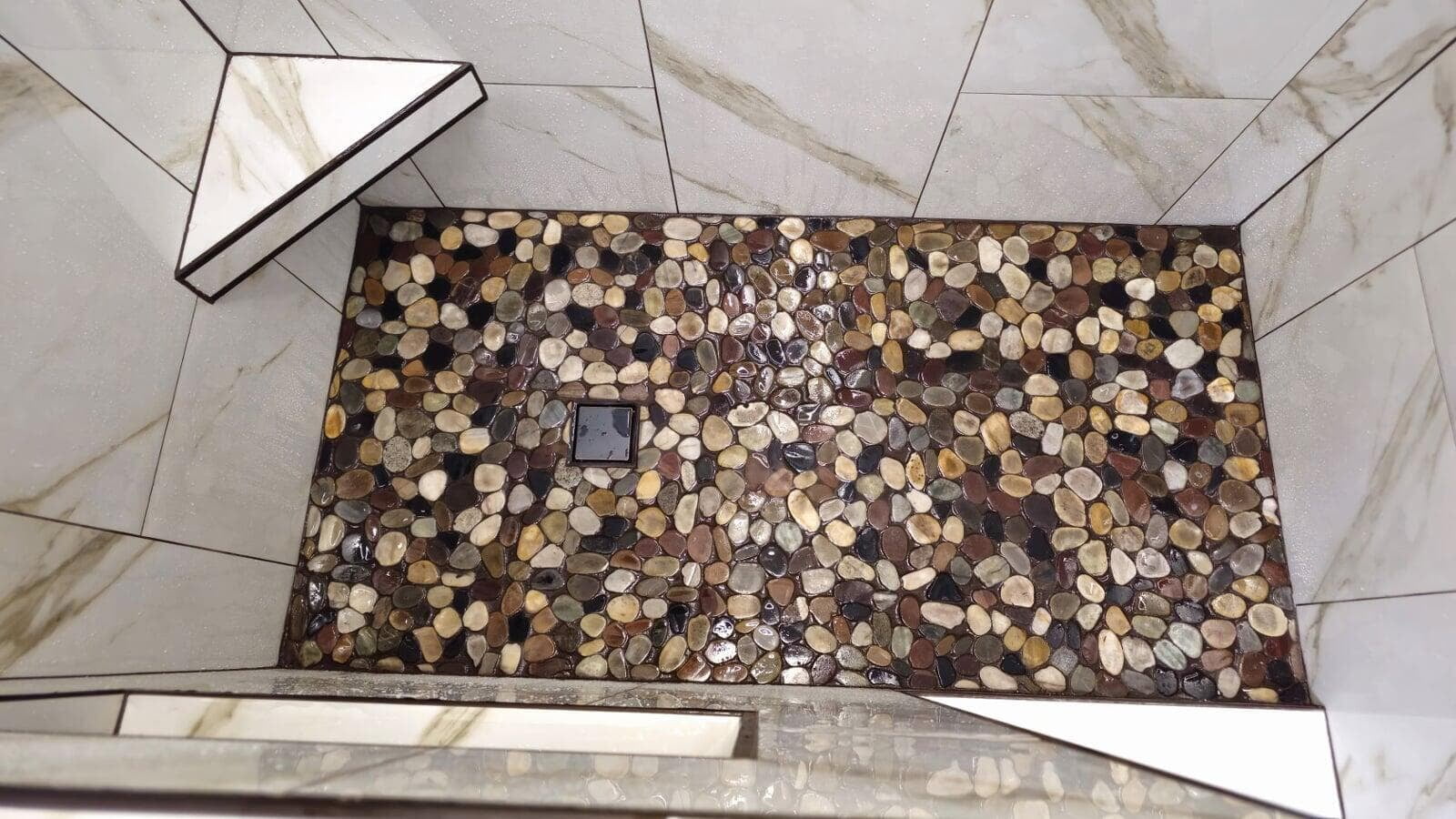
When it comes to renovating your bathroom, every detail counts, and the shower floor is no different. Selecting the right option for your shower floor not only boosts functionality and safety but also enhances the overall look of your space.
With so many materials to choose from, each with its own set of pros and cons, the decision can feel daunting. This guide will walk you through the most popular shower floor options, highlighting their materials, benefits, and potential drawbacks.
When it comes to renovating your bathroom, every detail counts, and the shower floor is no different. Selecting the right option for your shower floor not only boosts functionality and safety but also enhances the overall look of your space.
With so many materials to choose from, each with its own set of pros and cons, the decision can feel daunting. This guide will walk you through the most popular shower floor options, highlighting their materials, benefits, and potential drawbacks.
The Importance of Choosing the Right Shower Floor
The Importance of Choosing the Right Shower Floor
- A well-selected shower floor complements the bathroom design and ensures a safer environment by reducing slips and falls.
- The right flooring material enhances the longevity of your shower space, making it a valuable investment for your bathroom renovation.
- Choosing the right material is crucial for achieving the perfect balance of style and safety in your bathroom.
Shower Floor Material Options
Shower Floor Material Options
01. Ceramic Tile
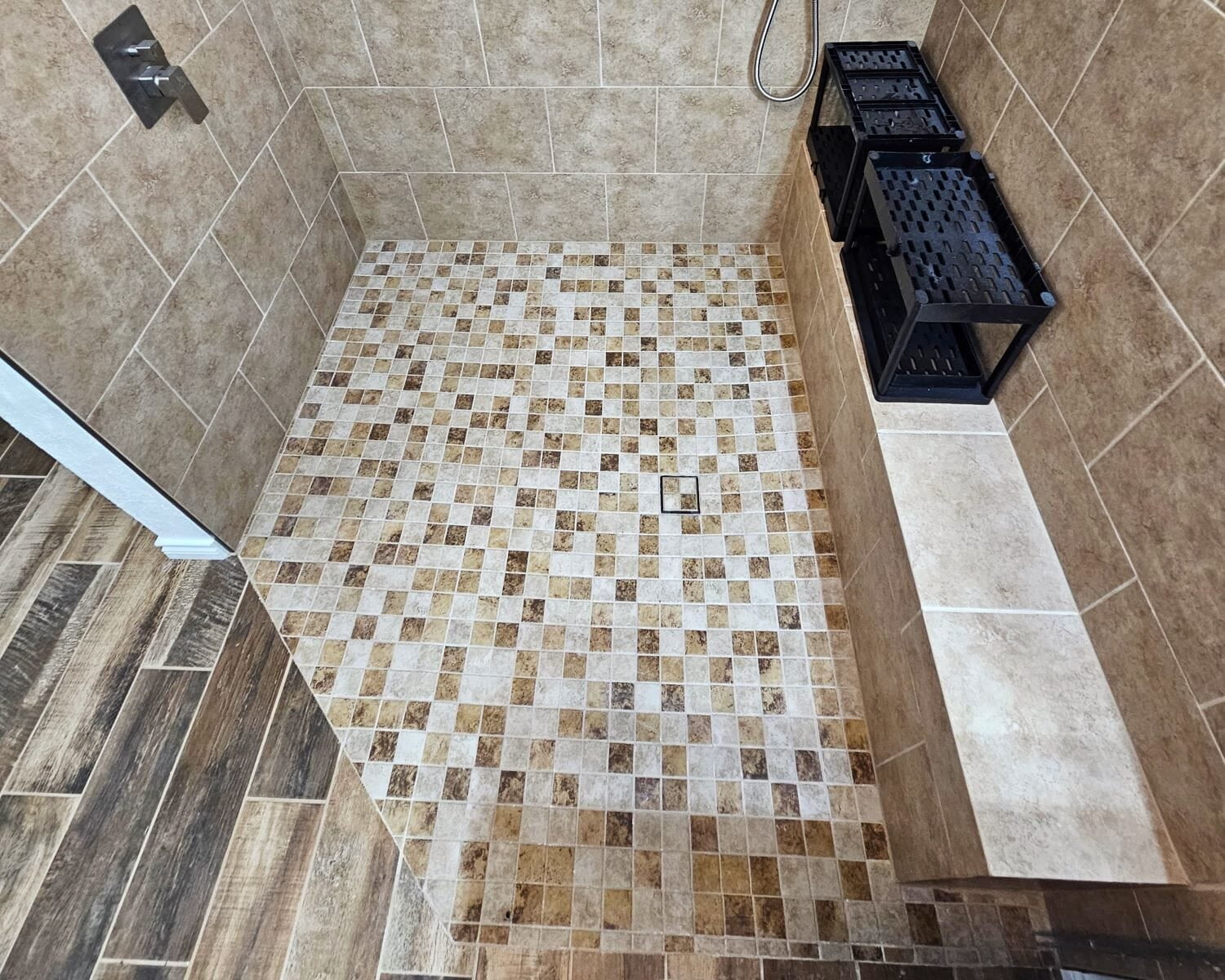
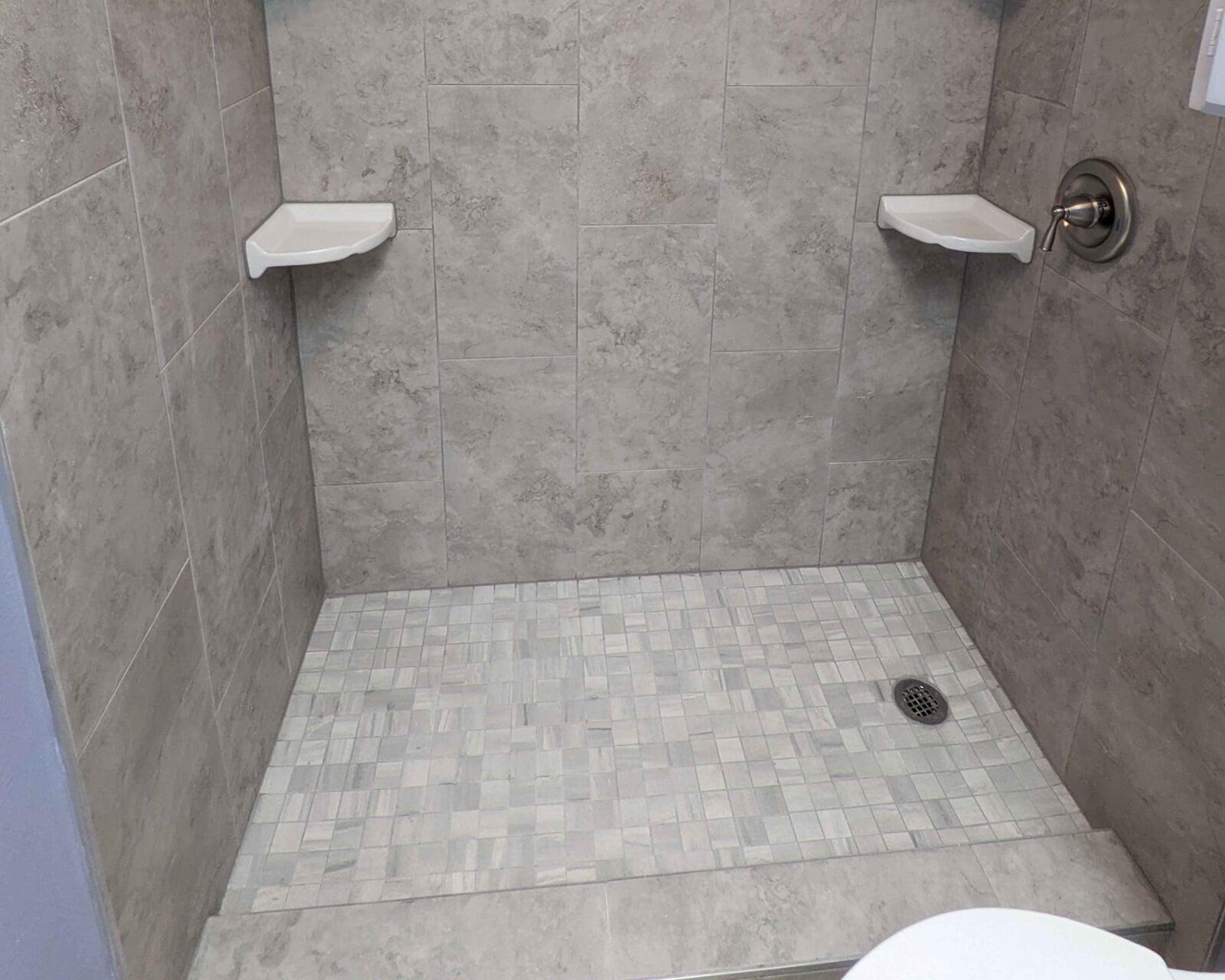
Ceramic tiles are a classic choice for shower floors, and it’s easy to see why. Crafted from natural clay and fired in a kiln, these tiles are both durable and adaptable.
Benefits:
Variety of Designs: With a vast array of colors, patterns, and sizes, ceramic tiles allow homeowners to achieve everything from bold, contemporary looks to timeless, classic styles.
Water Resistance: These tiles boast excellent water resistance, making them ideal for moist environments.
Durability: Ceramic tiles can handle everyday wear and tear without losing their appeal.
Cost-Effective: Compared to some premium materials, ceramic tiles offer an affordable solution.
Drawbacks:
Drawbacks:
Grout Maintenance: The grout lines between tiles need regular cleaning and sealing to avoid staining or mold.
Cold Surface: Ceramic tiles can feel chilly underfoot, which may be uncomfortable, especially in colder months.
Potential Slipperiness: Without texture or treatment, ceramic tiles can become slippery when wet.
02. Porcelain Tile
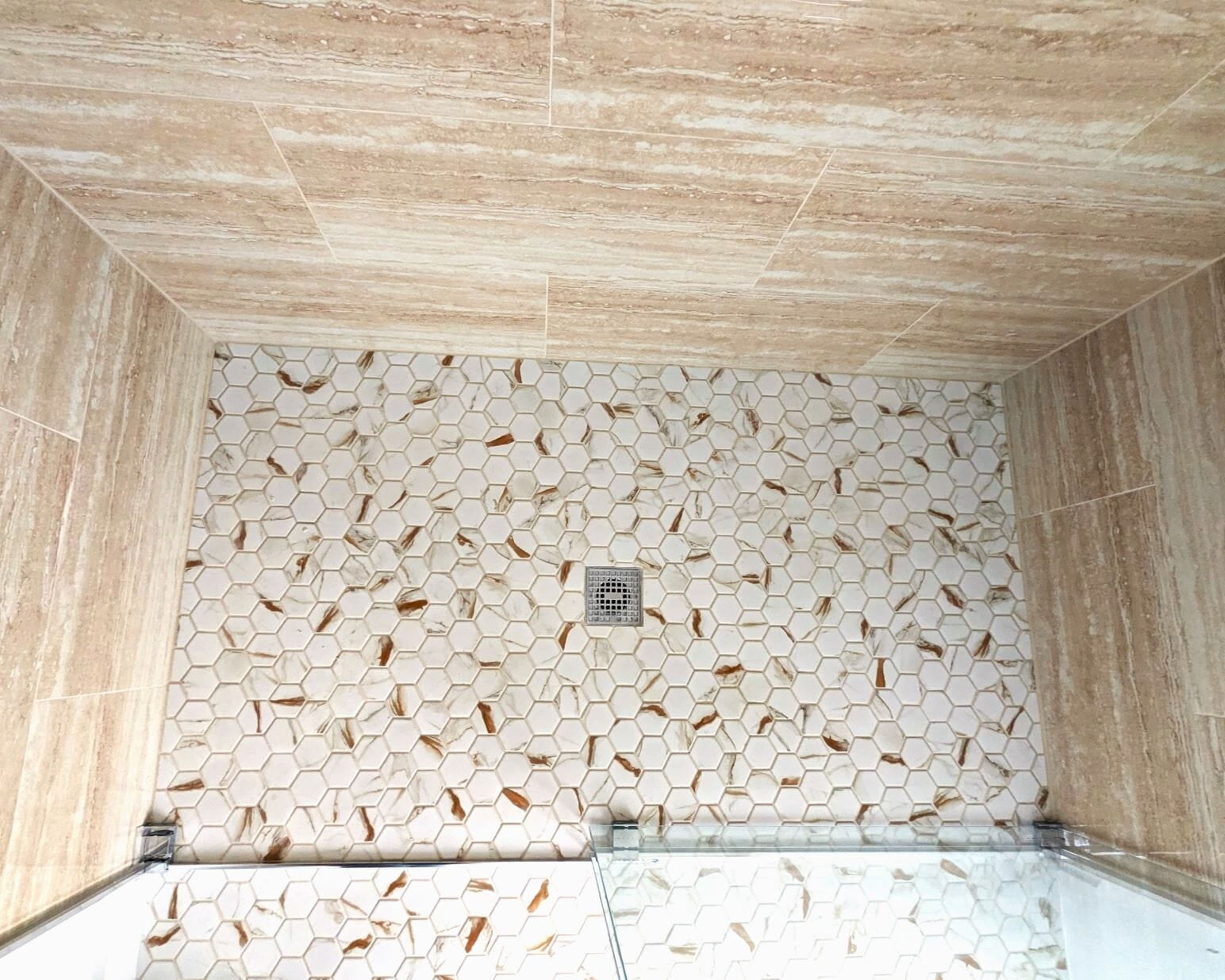
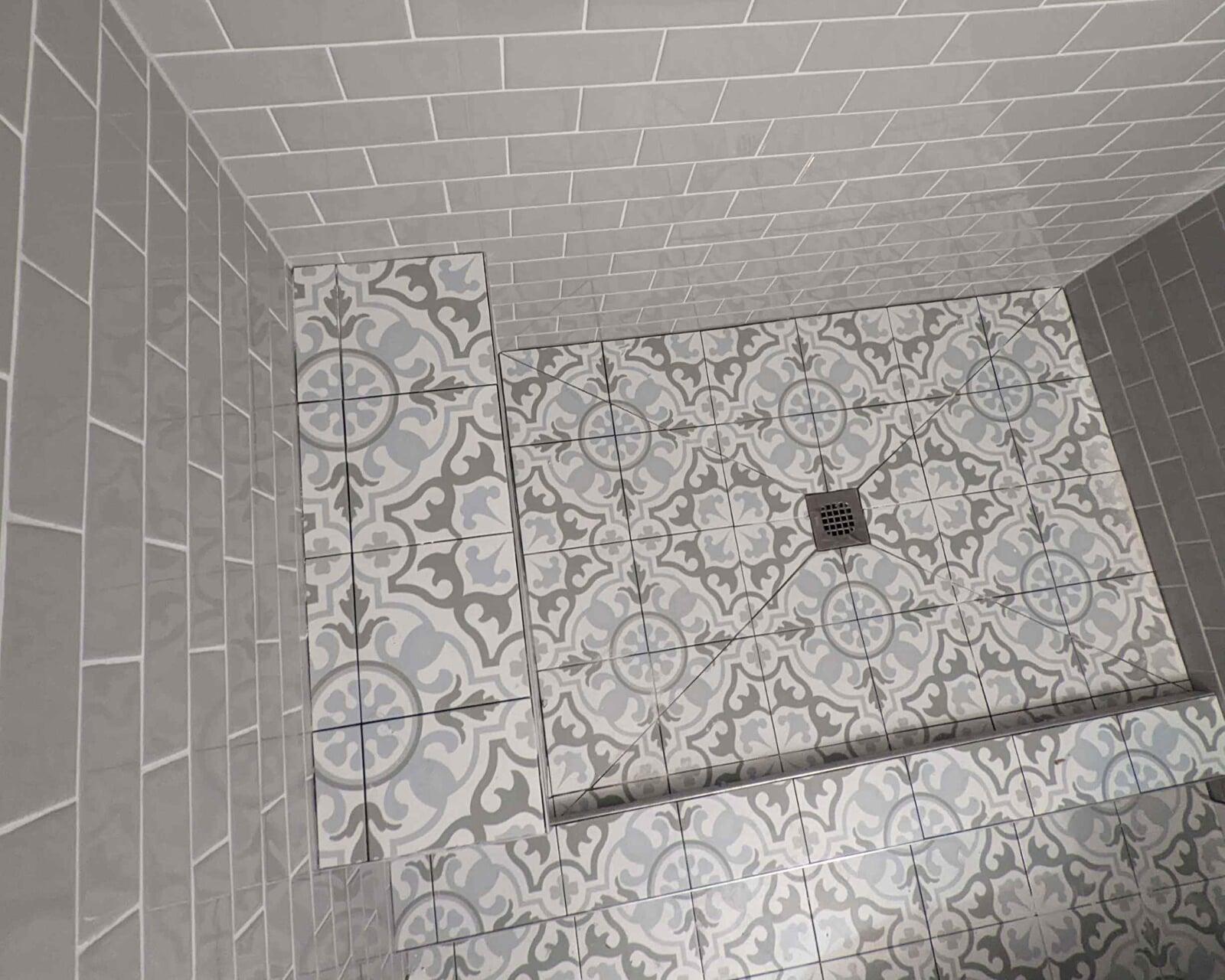
Porcelain tiles take ceramic tiles up a notch, known for their higher density and superior water resistance. They are often preferred for shower floors due to their performance and design flexibility.
Benefits:
Benefits:
Exceptional Durability: Porcelain tiles are less likely to chip or crack compared to ceramic.
Low Porosity: Their dense structure makes them highly resistant to water, minimizing the risk of damage or mold.
Design Versatility: Porcelain tiles can mimic natural stone or wood, providing an elegant appearance without the maintenance concerns.
Long Lifespan: With proper installation, porcelain tiles can last for many years.
Drawbacks:
Drawbacks:
- Higher Cost: Generally, porcelain tiles are pricier than ceramic.
- Installation Challenges: Their density can make porcelain tiles more difficult to cut and install, often requiring professional help.
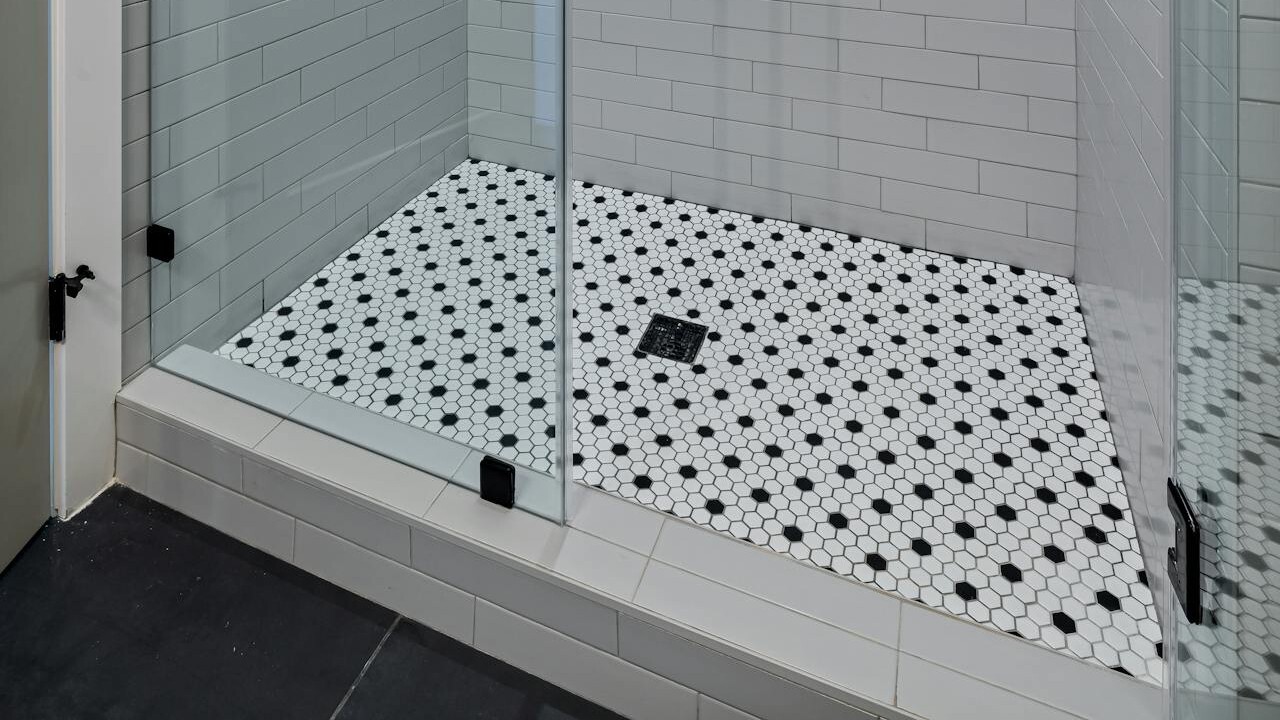
03. Natural Stone Tile
03. Natural Stone Tile
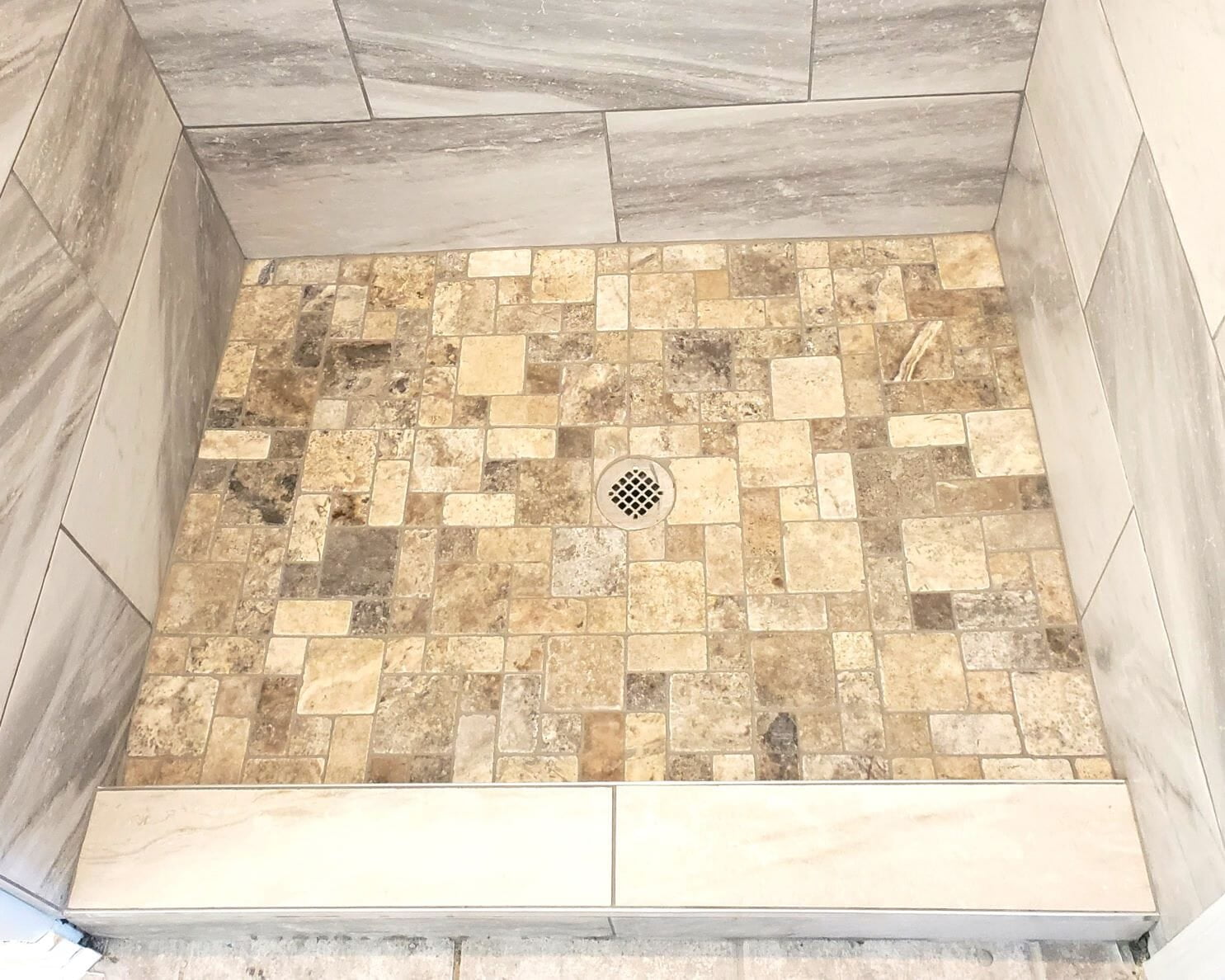
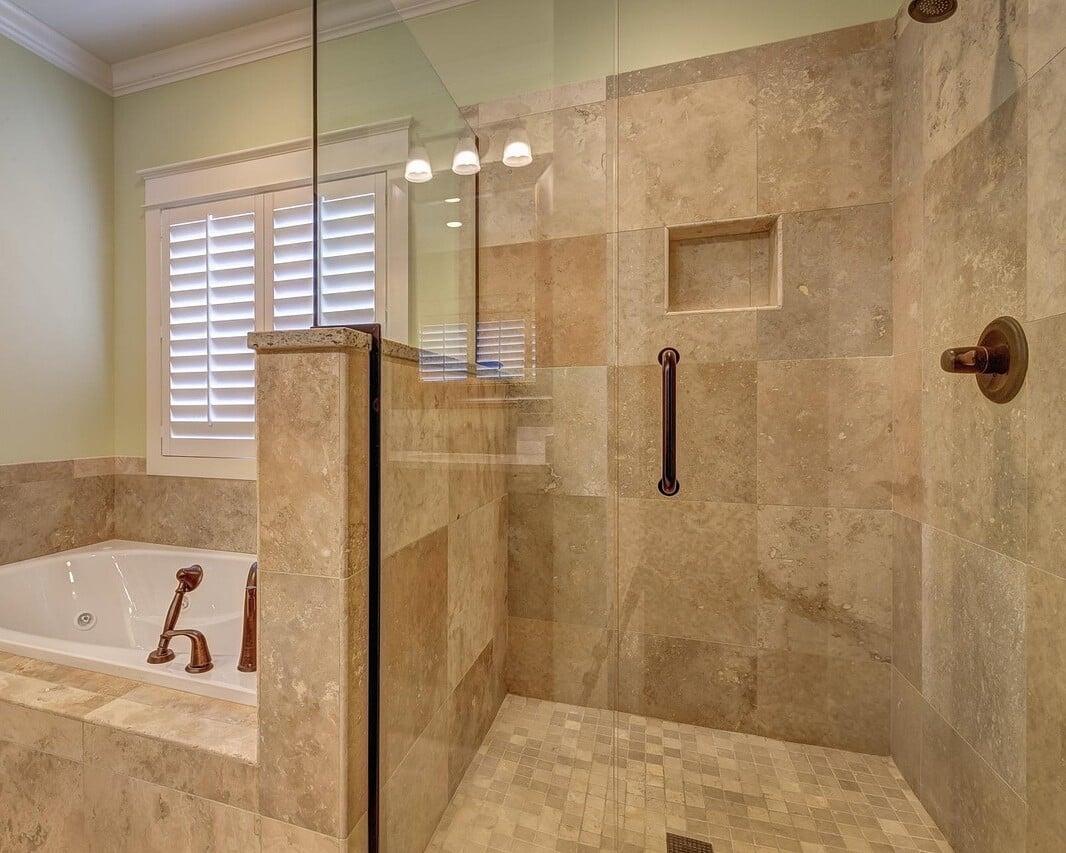
For those desiring a luxurious and distinctive look, natural stone tiles are an excellent option. Materials like marble, granite, slate, and limestone offer unique textures and patterns.
Benefits:
Benefits:
Unique Appearance: Each natural stone tile is one-of-a-kind, ensuring your shower floor stands out.
Timeless Elegance: Natural stone adds a sophisticated touch to any bathroom.
Durability: Many stones, like granite and slate, are incredibly tough and long-lasting.
Slip Resistance Options: Certain stones, such as slate, have naturally textured surfaces that enhance traction.
Drawbacks:
Drawbacks:
High Maintenance: Natural stone requires sealing to guard against water damage and stains due to its porous nature.
Cost: The price of both the material and installation can be significantly higher than other options.
Cold and Hard Surface: Stone floors can feel uncomfortably cold and hard underfoot.
04. Pebble Tile
04. Pebble Tile
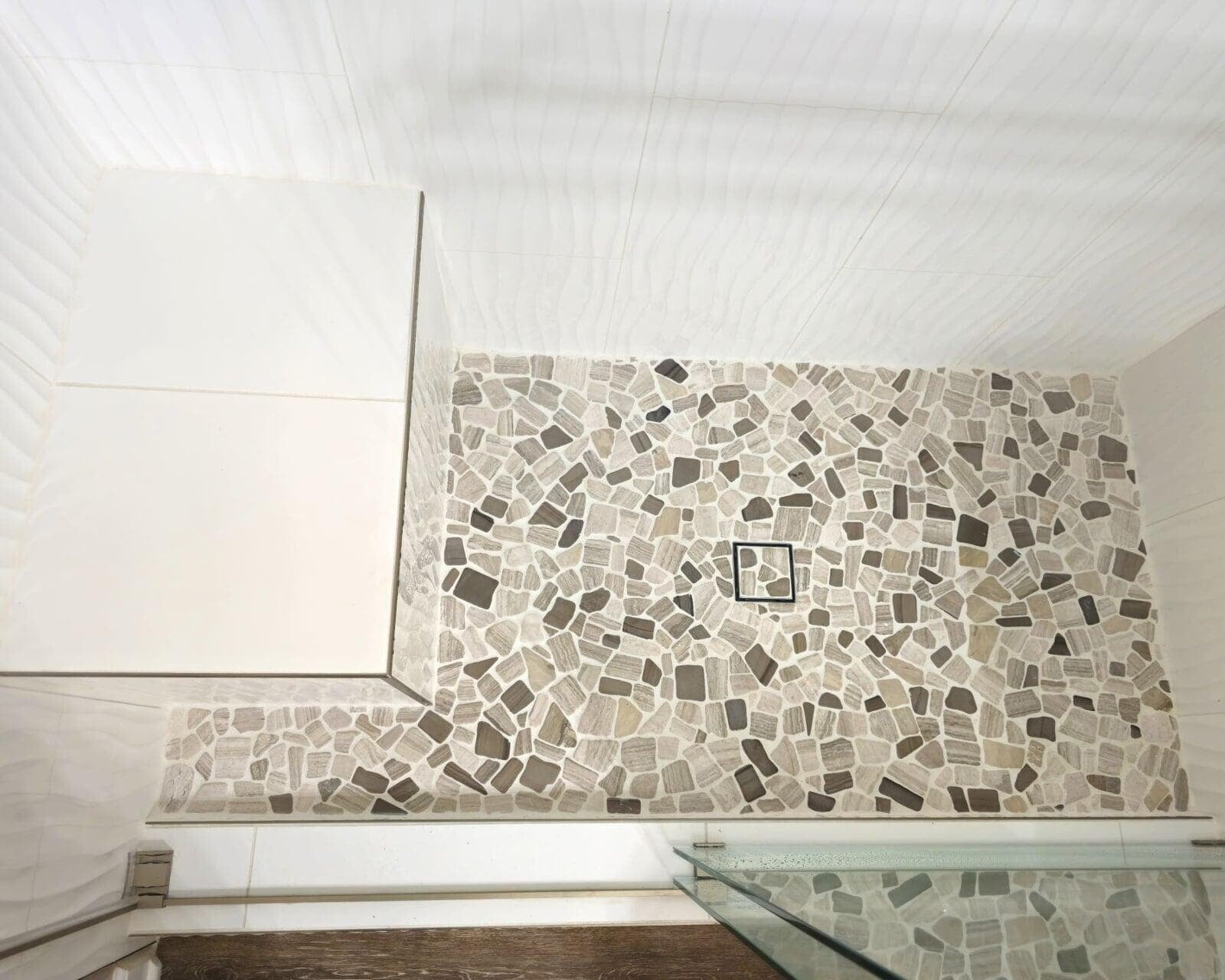
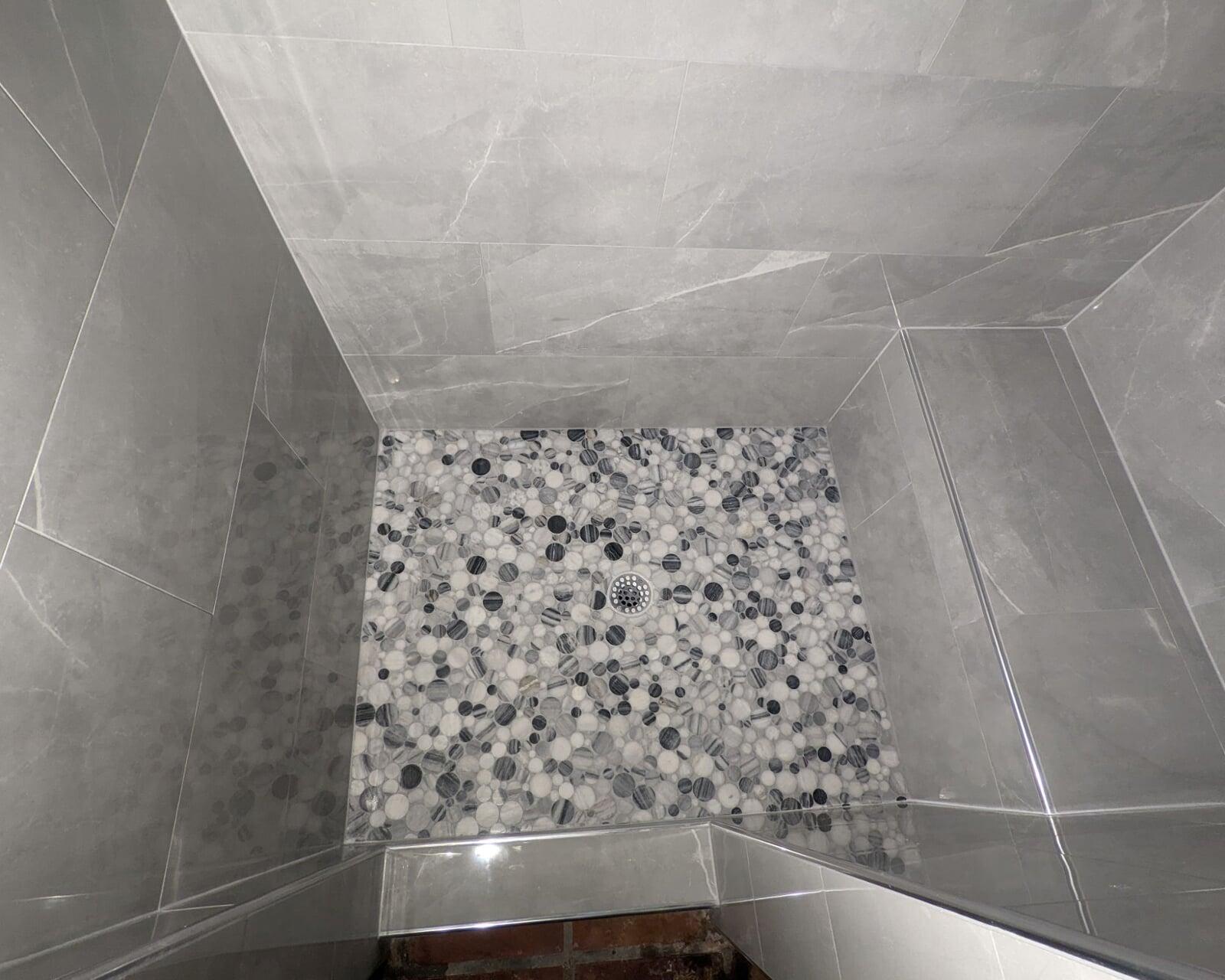
Pebble tiles are made from small, flat stones that are hand-picked and placed on mesh backing to create a beautiful mosaic tiles surface. These tiles offer a unique and natural look to your shower floor tiles.
Benefits:
Benefits:
Natural Beauty: Pebble tiles create an organic, spa-like atmosphere in the bathroom.
Slip Resistance: The textured surface offers excellent traction, reducing the risk of slips.
Customizable Layouts: Pebbles can be arranged in various patterns, allowing for creative design options.
Drawbacks:
Drawbacks:
Uneven Surface: Some may find walking on pebble tiles uncomfortable over time.
Difficult to Clean: The uneven texture can trap dirt and soap scum, requiring more effort to maintain.
Grout Challenges: Pebble tiles need more grout, which can increase installation and maintenance time and costs.
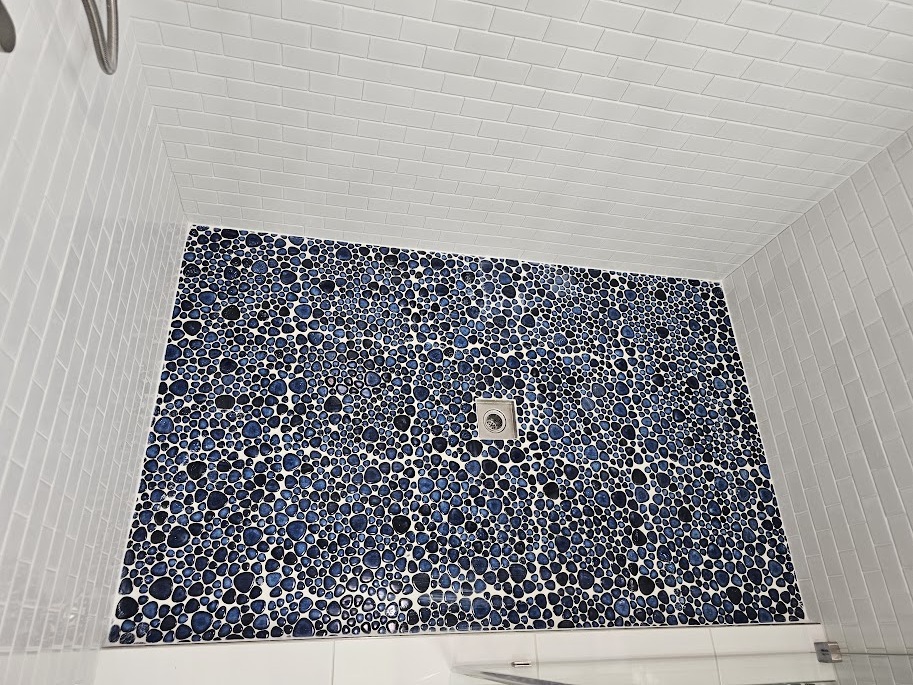
05. Solid Surface
05. Solid Surface
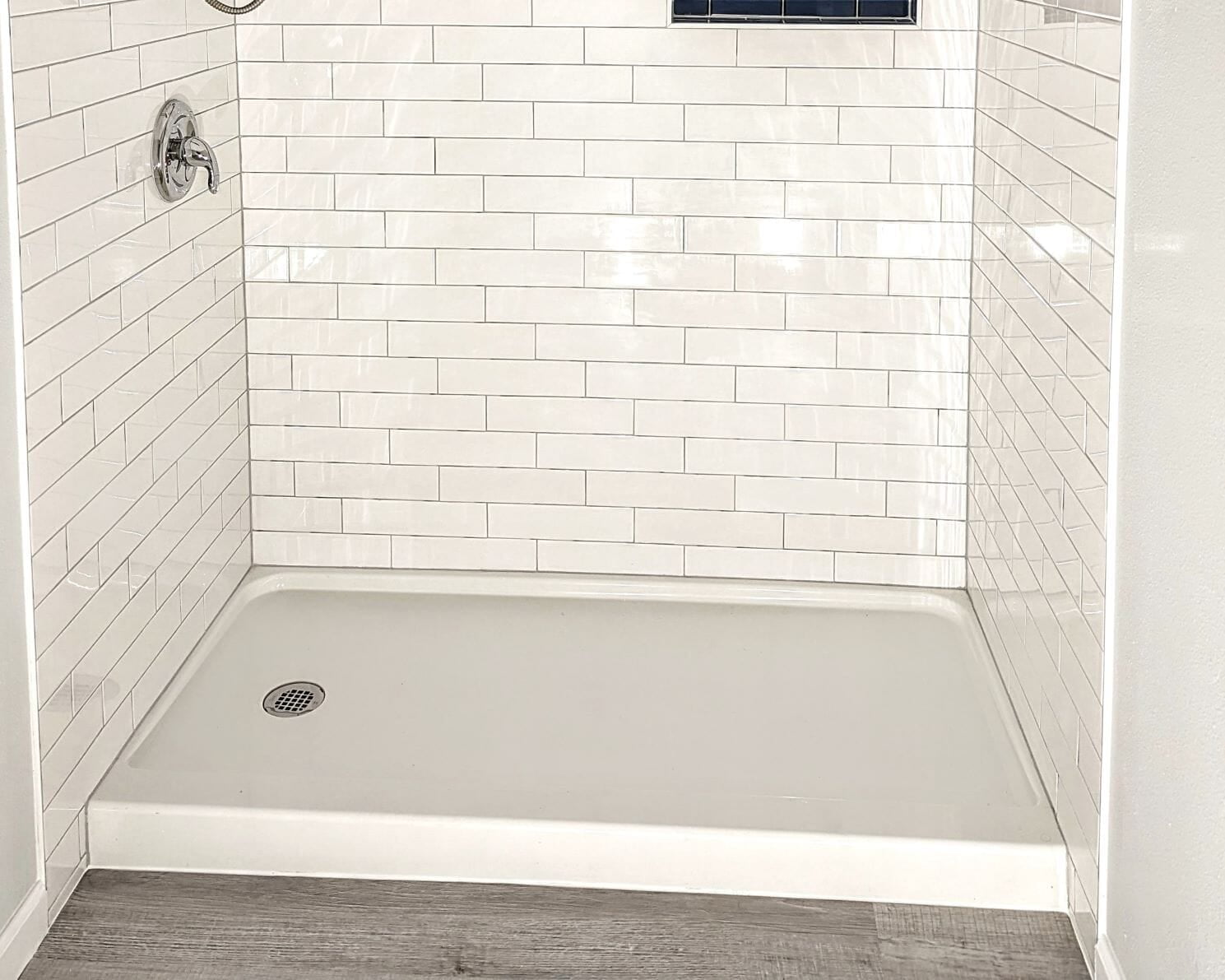
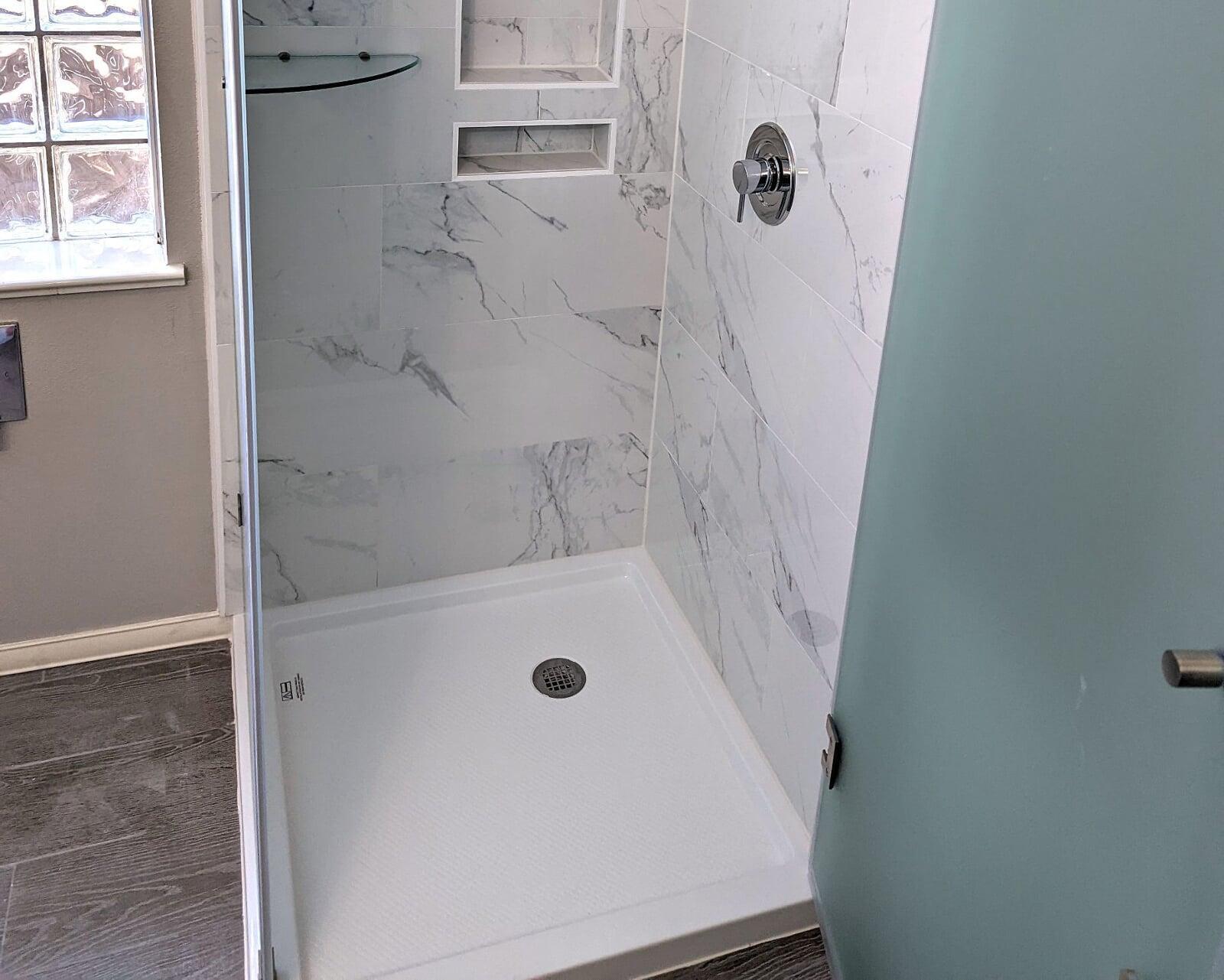
Solid surface materials, such as cultured marble and acrylic, are engineered to provide a seamless and easy-to-clean surface. They are non-porous and resistant to stains and mildew. Solid surfaces can be molded into various shapes and sizes, allowing for custom shower flooring designs that fit perfectly into your layout.
Benefits:
Benefits:
Seamless Appearance: Solid surfaces eliminate grout lines, resulting in a sleek, contemporary look.
Low Maintenance: With no grout to clean and a non-porous surface, solid surfaces are easy to care for.
Water Resistance: These materials are impervious to water, reducing the chances of mold and mildew.
Comfortable Underfoot: Solid surfaces retain heat better than tile, offering a warmer feel in cooler climates.
Drawbacks:
Drawbacks:
Limited Customization: Solid surface materials often have fewer colors and patterns compared to tiles.
Vulnerability to Scratches: Sharp objects or heavy impacts can scratch or dent the surface.
Cost: While not as expensive as natural stone, solid surfaces can be pricier than ceramic or vinyl.
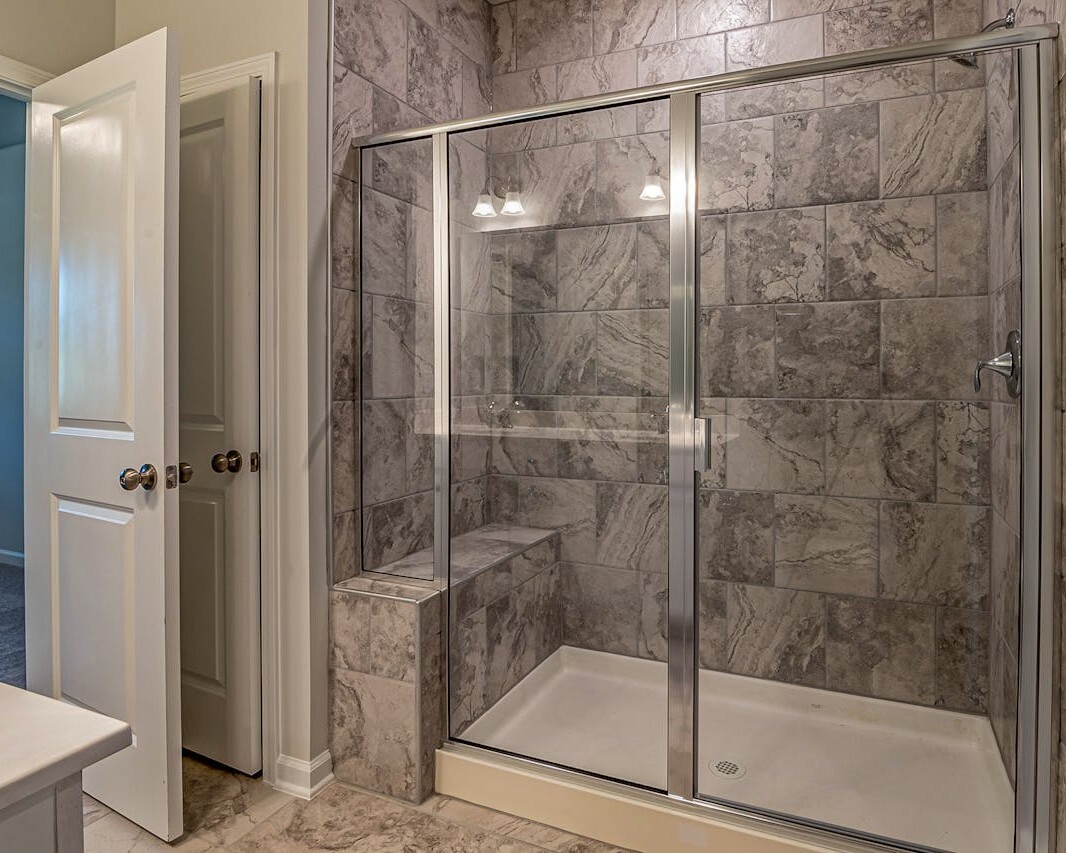
06. Vinyl Flooring
06. Vinyl Flooring
Vinyl flooring is a budget-friendly option that has gained traction in recent years due to its improved durability and design variety. Available in sheets and tiles, vinyl can mimic the appearance of natural materials like wood or stone.
Benefits:
Benefits:
Affordable: Vinyl is one of the most economical shower flooring choices available.
Easy Installation: It can often be a DIY project, saving on labor costs.
Water Resistance: Vinyl is highly resistant to water and moisture, making it perfect for wet areas.
Soft Underfoot: Compared to tile or stone, vinyl feels softer and warmer to walk on.
Drawbacks:
Drawbacks:
Durability Concerns: Vinyl is less durable than other materials and may be prone to scratches or dents.
Shorter Lifespan: While cost-effective, vinyl may need to be replaced sooner than other options.
Environmental Impact: Vinyl is not biodegradable and may not be the most eco-friendly choice.
07. Glass Tiles
07. Glass Tiles
Glass tile is a favored choice for walk-in shower floors due to its robust durability and hassle-free maintenance. Its water-resistant nature makes it an ideal selection for high-traffic shower areas, ensuring longevity and reliability.
Benefits:
Benefits:
Water Resistance: Being non-porous, glass tiles do not absorb moisture, ensuring a long-lasting surface.
Durability: Properly installed glass tiles can withstand heavy use without cracking or fading.
Easy to Clean: The smooth surface of glass tiles resists stains and grime, requiring minimal maintenance.
Drawbacks:
Drawbacks:
Higher Cost: Glass tiles can be more expensive than ceramic or porcelain.
Slippery When Wet: Unless treated with anti-slip coatings, glass tiles may pose a slipping hazard.
Professional Installation Recommended: For glass tiles, it is advisable to have them professionally installed to ensure this flooring material is correctly placed for lasting quality and appearance.
Key Factors to Consider When Choosing a Shower Floor
Key Factors to Consider When Choosing a Shower Floor
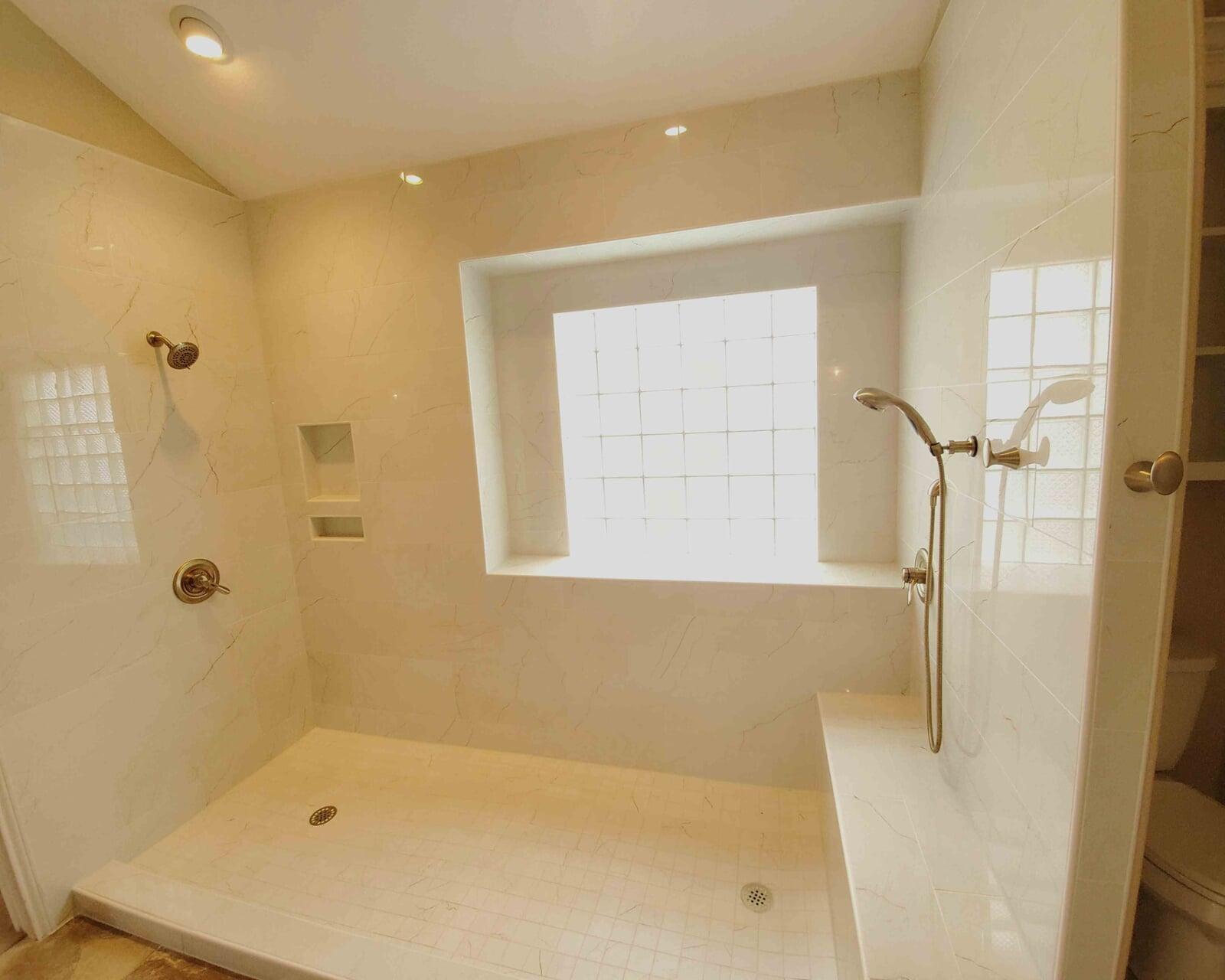
When selecting the right material for your shower floor, keep these factors in mind:
Durability: How much foot traffic will your shower see? Choose shower floor tiles like porcelain or natural stone for high-traffic bathrooms.
Water Resistance: In a wet environment, opt for non-porous materials like porcelain, vinyl, or solid surface to minimize water damage.
Slip Resistance: For safety, prioritize textured surfaces like pebble tiles or anti-slip ceramic tiles, which offer excellent slip resistance.
Aesthetic Preferences: Think about how the shower floor will complement your overall bathroom design. Do you prefer a sleek, modern vibe or a rustic, natural feel?
Budget: Balance your desired look with your available budget. Vinyl and ceramic are more affordable, while natural stone and solid surface options may cost more.
Maintenance: If you prefer low-maintenance options, solid surfaces or larger tiles with minimal grout lines are ideal.
FAQs
FAQs
What is the Best Material for a Shower Floor?
What is the Best Material for a Shower Floor?
The best material depends on your needs and preferences. Porcelain and ceramic tiles are highly durable and water-resistant, while natural stone offers unique aesthetics. Vinyl is a good budget-friendly option.
What makes some bathroom floor tiles different from others?
What makes some bathroom floor tiles different from others?
Some bathroom floor tiles are made to be safer because they help prevent slipping. These tiles often have a rougher surface or a higher grip, which makes them less slippery when wet.
Are pebble tiles comfortable to stand on in the shower?
Are pebble tiles comfortable to stand on in the shower?
Yes, many people find pebble tiles comfortable because the smooth, rounded stones feel gentle under your feet. They can also give a nice, massaging sensation.
What is the best shower floor without grout?
What is the best shower floor without grout?
For those seeking a shower floor without grout, solid surface materials are an excellent choice. These materials, such as cultured marble or acrylic, offer a seamless and easy-to-clean surface, eliminating the need for grout lines.
What is the safest shower floor for seniors?
What is the safest shower floor for seniors?
When considering the safest shower floor for seniors, it's important to select shower floor tiles with a non slip surface. Options like textured porcelain tiles or pebble tiles provide better grip and reduce the risk of slipping, ensuring excellent slip resistance.
Your choice of shower floor can make a big difference in your bathroom, turning it into a stylish and practical space. Whether you prefer the affordability of ceramic and vinyl or the elegance of natural stone and glass tiles, there’s an option that suits every look, need, and budget.
If you’re in Corpus Christi or South Texas and feel unsure about which shower floor to choose, or if you’d like help with installation, we’re here to help.Contact us today to talk about your options and get started on creating the bathroom you’ve always wanted!

